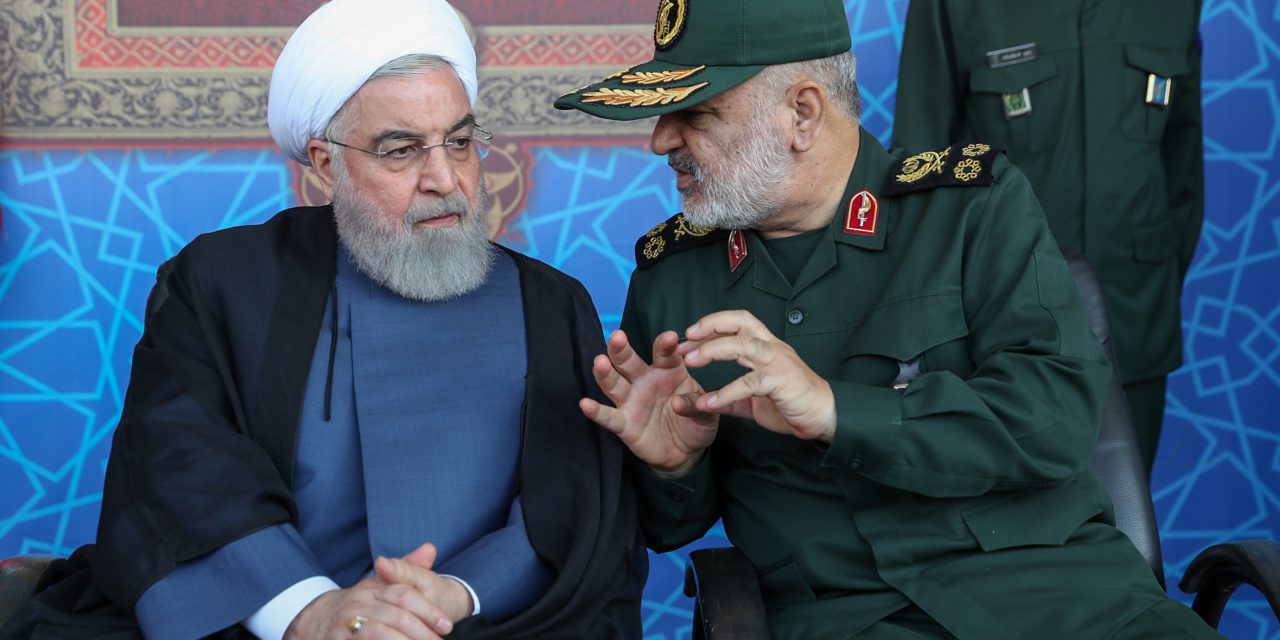Iran’s President Hassan Rouhani listens to Revolutionary Guards commander-in-chief Maj. Gen. Hossein Salami, September 22, 2019 (AFP/Getty)
The Iranian military’s downing of a Ukraine passenger jet, killing 176 passengers and crew, has fed tension between President Hassan Rouhani and the armed forces, particularly the Revolutionary Guards.
Ukraine International Airlines Flight 752 was struck on January 8 by fragments of two missiles fired by an Iranian air defense crew, hours after Iran attacked two Iraqi bases with US personnel in retaliation for the American assassination of leading commander Maj. Gen. Qassem Soleimani.
The Iranian military lied about the incident, quickly claiming that the cause was catastrophic engine failure. The Rouhani Government says it was not informed until Friday, two days after the shootdown, of the circumstances.
Facing international pressure, the military and then Rouhani finally admitted on Saturday that the jet had been shot down. The statements sparked four days of protests in Iranian cities, especially near universities, calling for resignations and criticizing officials including the Supreme Leader.
See also Iran Daily, January 13: Protests Spread Over Regime’s Downing of Ukraine Passenger Jet
Rouhani has pressed his case by calling for a special court of investigation, saying he wants the issue “to be addressed to the people with honesty”.
A former commander of air defense forces, the President said, “The familiarity I have with air defense issue, I say that it can’t be one person who is responsible for this. Not just the person who pressed the button — there are others too.”
Government spokesman Ali Rabaei emphasized that the Government’s false statements immediately after the downing “was due to being kept uninformed”.
On Wednesday, carefully navigating the political situation, Rouhani told the Cabinet, “Those who made the mistake are the same people who are making attempts for the country’s security.”
He nodded to the military, “The Armed Forces took the first step well by investigating the matter,” but then began to press, “They have to take the next steps with more coordination and monitoring.”
Rouhani continued:
We must not abandon this case and must compensate for it. The first thing is to inform people honestly. People’s grief will alleviate when they know that we feel responsible for what happened and talk with them honestly.
The first compensation is that the Judiciary, the Armed Forces and the government all cooperate with each other to closely pursue the issue and conduct a satisfying judicial action.
“The final step is to make sure such incidents are unrepeatable; not that it must not happen again, but rather it must be unrepeatable through revisiting the regulations.
He challenged, “I urge the Armed Forces and the General Staff to explain to people what sessions and meetings were held since the moment that the incident happened to let people know that they did not want to conceal anything from them.”
Rouhani v. Guards
Rouhani and the Revolutionary Guards have periodically clashed since the President took office in August 2013.
The main front has been the Iranian economy, in which the Guards have an extensive stake through their engineering and logistics branches and through large shares in companies and utilities.
By the end of 2014, the President and the Guards were trading accusations of corruption, as Rouhani called for the “elimination” of monopolies: “When weapons, wealth, and media are in control of a single institution, an inevitable result would be corruption.”
The Guards, the Basij militia, and allied clerics and MPs counter-attacked: “Unlike what some politicians say, the Basij and Revolutionary Guard need to be present on all grounds including the ‘defensive economy’. It is only this way that corruption can be eradicated.”
See also Iran Daily, Dec 14, 2014: Rouhani Attacked Over “Corruption” & Revolutionary Guards
Both sides pulled back from a showdown, but skirmishes have continued amid the imprisonment of prominent businessmen and officials for corruption.
In October, Rouhani’s brother and former senior advisor Hossein Fereydoun was given a 5-year sentence and fined about $7.4 million for “receiving bribes”. Mehdi Jahangiri, the brother of 1st Vice President Es’haq Jahangiri and the head of the Tehran Chamber of Commerce, was charged with financial crimes, and Mohammad Hadi Razavi, the son-in-law of Labor Minister Mohammad Shariatmadari, is facing trial over embezzlement and “disruption of the economy”.
In November, Rouhani hit back in a speech in central Iran:
Why is the corruption of big figures not dealt with? Taking a few [junior] people to court and making propaganda does not fool people….
Anyone involved in corruption must be prosecuted. There should be no talk of factions and parties in fighting corruption. I urge the judiciary to explain to people what has been done in fighting billion-dollar corruption.
See also Iran Daily, Nov. 11: Rouhani v. Hardliners Over Corruption
Less than a week later, mass protests erupted across Iran. Initially about the Government’s sudden escalation of petrol prices, they expanded into a challenge to corruption, with the burning of banks and Government buildings.

